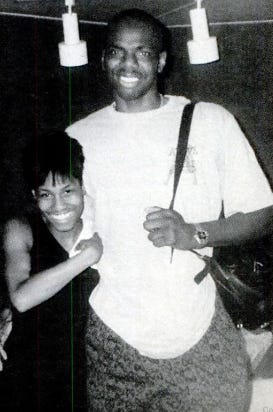Tyrone Hill and All Net Records
A look back at the former NBA player's short-lived label and its signature artists D'Meka and OTR Clique.
On December 30th, 2020, I wrote an article titled “Pimp C on the Track.” I explored the late Underground Kingz (UGK) member’s considerable skills as a producer - a part of his story that is sometimes overlooked given his talent on the mic. To showcase his sound I featured X-Mob’s hard-hitting “Whatcha Gone Do” (1996) and the somber tones of Crooked Lettaz’s “Get Crunk” (1999) - a track producer Mr. Lee would sample and interpolate six years later for Paul Wall’s “Sippin’ Tha Barre.”
Another song that came to my attention was D’Meka’s UGK-assisted “Money Stacks” from her 1997 solo debut Now... Feel Me!. Bun B and D’Meka have great chemistry as they trade verses while a sung hook by Pimp C takes the whole experience to another level. It’s an impressive song and I’m honestly surprised it hasn’t found more of an audience on YouTube, a place where so much music finds a second life and new listeners.
I had never heard of D’Meka before and I was really taken with this song, so I decided to dig into the Cincinnati, Ohio rapper’s work. As I tracked down other selections from Now... Feel Me! I appreciated her skills as an MC and a the album’s production from esteemed artists like Rap-A-Lot/Scarface collaborator John Bido, Bootsy Collins, Bud'da, Stevie J of The Hitmen, and several others.
I also learned that D’Meka was in the group OTR Clique for two of their three albums, all of which seem to be highly regarded in Cincinnati and beyond the geographic confines of Ohio. YouTube comments for their Streets Deeper Than The Grave single “Life Goes On” (1995) indicate that the song made it all the way down to Houston, Texas back in the day.
Recently I did a thread about the incredible rap archive The Good Ol’ Dayz, a website that gives visitors the opportunity to explore independent rap releases from every state in the US through their handy map. During my thread I mentioned OTR Clique and the fact that their albums are featured on The Good Ol’ Dayz.
As I added to the thread, Forbes journalist Nick Diunte pointed out that former NBA player Tyrone Hill put out their album. I was fascinated by this so I decided to do some digging to learn more about his stint in the music business.


Hill was a solid, hard-working player and Cincinnati native. He played college basketball for Xavier, was a 1990 lottery pick for the Golden State Warriors, and earned his lone NBA All-Star appearances in 1995 with the Cleveland Cavaliers. His label was called All Net Records and according to a 1997 Jet article titled “Athletes Find Success In Music Industry,” his brother Aaron was the label’s senior vice president.
Based on their Discogs page All Net’s active years ran from 1995 to 1999. During that span they released five full-length albums (two from OTR Clique and one from D’Meka) and a number of singles. A 1998 Vibe article that is no longer fully accessible mentioned that Hill signed a distribution deal with PolyGram affiliate Platinum, but it seems that didn’t work out as intended. The label shuttered their doors just a year later and had already released the bulk of their catalog at that point.

NBA players have navigated the music industry with mixed results. Shaq’s 1994 debut Shaq Diesel went platinum not long after Jive released it thanks his star power, some excellent production, two modest hit singles, and the label muscle of an independent with major parent companies. Though his sophomore effort went gold, he was never able to achieve the same level of success.
And John Salley - despite his popularity in Detroit and his decision to manage a young Slum Village - was never able to get his Hoops recording studio off the ground. His industry struggles are well documented in Dan Charnas’ excellent new biography Dilla Time: The Life and Afterlife of J Dilla, the Hip-Hop Producer Who Reinvented Rhythm.
Hill’s reasons for ultimately shutting down All Net are not documented anywhere that I could find, so it’s hard to say exactly why his music endeavor didn’t pan out. In the Jet article he stated that he spent two or three days a week pushing his artists to radio stations and record stores. Successful independent labels from this time period often shopped their acts relentlessly to help them gain a wider net of support. A few days a week might have been too few. One also has to wonder how much the production roster for D’Meka’s album cost the label, as big name producers could command quite a high rate at this time.
Hill stated in the 1997 Jet article, “I’m trying to win my first championship in basketball, and I want to win a championship in music.”
Sadly, neither of those dreams would come to fruition. Yet he still deserves credit for a 16-year NBA career and for his decision to give some important Cincinnati pioneers their first major break. Hopefully someone will take a chance on reissuing the All Net Records catalog so D’Meka and OTR Clique can have a chance at reaching the audience they deserved when they were active.
If you enjoyed this article and want to support Micro-Chop you can subscribe to the newsletter and YouTube channel. You can also buy me a coffee.



